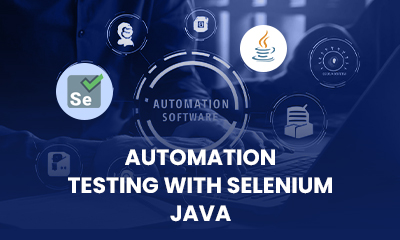This course equips manual testers to transition into automation testing, mastering Selenium WebDriver with foundational Java skills, TestNG basics, and best coding practices. Certification and hands-on experience included. As one of the most trusted options for learners seeking a Selenium java automation course in Australia, this program ensures real-world readiness and industry-level exposure.
Overview
The Selenium course is designed to familiarize testing professionals with the basics of testing web applications using Selenium. Testers can build, enhance, and maintain scripts using both the Selenium IDE and the Selenium WebDriver. Hands-on instruction is provided for those who want to explore the power of using Selenium. The Selenium IDE plug-in builds effective and resilient test scripts using a wide variety of current programming languages. The focus is on the practical application of Selenium WebDriver to resolve common web automated testing challenges. The Selenium certification focuses on using Selenium WebDriver with Java.
Learners enrolling from Sydney or across the country will find this automation testing with Selenium java course in Sydney highly beneficial, especially with its industry-aligned modules and step-by-step guidance suitable for beginners and professionals alike.
Duration
- The course is valid for 45 days (Online Portal)
- Extended doubt-clearing support and optional mentor-led live sessions are also available for learners seeking additional help during the 45-day access period.
Location
- Online (Self-paced modules with videos, quizzes, and assignments)
- As part of our automation testing java course online in Australia, students receive complete flexibility to learn from anywhere, supported by structured learning paths and downloadable study materials.
Intended Audience
- Manual testers, non-programming aware testers interested in learning Automation
- University Graduates who want to kick start their career in the IT world
- Professionals from different backgrounds who are interested in learning Automation
- Professionals who have a basic understanding of programming concepts, HTML, CSS
- This Selenium java automation testing training in Australia is also ideal for career switchers aiming to transition into high-demand automation roles within a short time frame.
Highlights Of The Training Program
- By end of this course, you will be mastered on Selenium WebDriver with Core java basics
- Case Study – Hands-on training on real applications
- Specialised Trainers to answer the query
- Post-Training Assessment Test (30 min)
- With all this knowledge gained, you should be easily able to clear Selenium Automation interviews
Additionally, the program includes resume-building guidance, mock interview rounds, and industry insights tailored specifically for candidates seeking automation roles in the Australian IT market.
Graduates of this Selenium java automation course in Australia often secure roles such as Automation Test Engineer, QA Analyst, SDET, and Test Automation Specialist.
FAQs
Will this course help me if I’ve only ever tested using intuitive, non-documented methods?
Absolutely. The program is structured to help you transition from instinct-based testing to a systematic, automation-driven approach, giving you the clarity and discipline required for professional-level automation work.
Do you cover real project environments where test scripts may break unexpectedly?
Yes. You’ll work on scenarios that intentionally include unexpected pop-ups, dynamic elements, and timing issues so you learn how to stabilise scripts in imperfect, real-world conditions.
Can I revisit complex modules even after completing the course?
Yes. Learners retain continued access to training modules for the full validity period, allowing you to return to advanced concepts whenever you need refresher practice.
Will I learn how to judge whether a task should be automated or kept manual?
Definitely. We include practical guidelines that teach you how to evaluate effort, stability, and long-term value – an ability many automation testers overlook.
Do you teach how to structure automation files so they remain understandable to new team members?
Yes. You’ll explore best practices in organising scripts, naming conventions, and framework layouts, helping you build automation solutions that teams can easily adopt and maintain.

